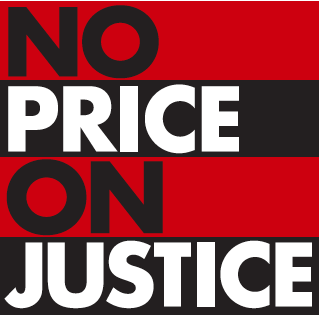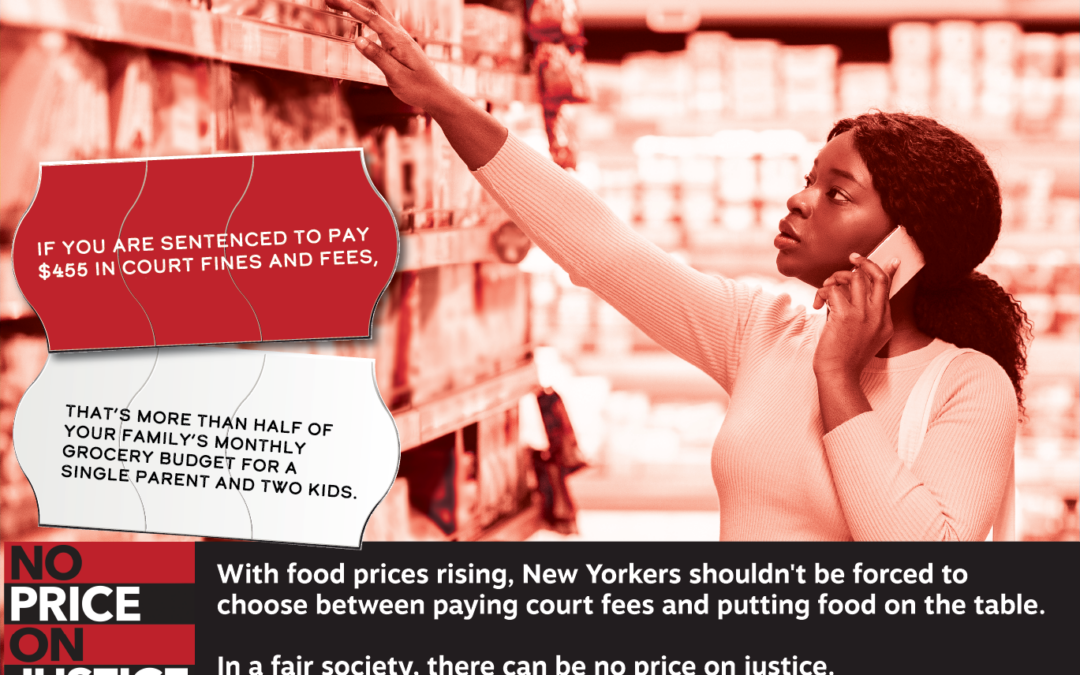FOR IMMEDIATE RELEASE
February 22, 2023
Contact: Katie Schaffer, kschaffer@communityalternatives.org, 646-265-2044
Legislators & Advocates Rally at Brooklyn Supermarket to Call for the Elimination of NY’s Predatory Court Fees
As Food Costs Surge, People with Court Debt Face An Impossible Choice Between Paying Court Fees to Avoid Arrest and Buying Groceries
Holding Egg Cartons and Milk Jugs, Speakers Demand the State Legislature Pass the End Predatory Court Fees Act
NEW YORK – This morning, legislators and advocates rallied outside a Key Food supermarket to demand passage of the End Predatory Court Fees Act, legislation in Albany which would eliminate New York’s court fees, mandatory minimum fines, incarceration on the basis of unpaid fines and fees, and garnishment of commissary accounts.
With the cost of basic needs rising, many New York families face an impossible choice: whether to put food on the table, or to pay down court debt in order to avoid incarceration and additional fees. In 2022, food prices increased drastically — 10% on average — putting families living paycheck-to-paycheck in a precarious position.
Video recording available here. Photos available upon request.
“In grocery stores like this one across the state, food prices are surging by an average of 10%,” said Peggy Herrera, community leader with Center for Community Alternatives. “Everyday, people who are struggling to pay their court fines and fees walk down these aisles doing an impossible math equation in their heads. Do I buy food and diapers for my children — or do I send that money to the courts to pay off my fees? I know firsthand how hard this is for families. I was arrested after calling emergency services to get help for my son who suffers with mental health challenges. The charges against me were dropped, but it took me four years to pay off all of the fines and fees. Families like mine are taxed, exploited and robbed by these fees. We are criminalized for our poverty, and forced into an endless cycle of debt and punishment. New York must pass The End Predatory Court Fees Act.”
Dozens of states and localities in states both red and blue have enacted reforms to eliminate fees in recent years. New York’s End Predatory Court Fees Act — which would end the state’s mandatory surcharge along with probation fees, mandatory minimum fines, incarceration on the basis of unpaid fines and fees, and garnishment of commissary accounts — was recently reintroduced by State Senator Julia Salazar and Assemblymember Kenny Burgos.
“This hidden, regressive system of taxation is entrenched in our state’s court and legal systems,” said New York Senator Julia Salazar, Senate sponsor of the End Predatory Court Fees Act. “But it doesn’t need to be: State leaders have much more equitable and efficient ways of raising revenue at our disposal.”
“These are mandatory fees whether or not a judge decides to impose a fine,” said Assembly Member Kenny Burgos, Assembly sponsor of the End Predatory Court Fees Act. “We impose fees on people we know cannot afford to pay them. We spend money trying to collect them and then we incarcerate people who cannot afford them, imposing further costs to our state and perpetuating the criminalization of poverty. If you believe in a true system of justice, if you believe that it should not be a crime to be poor, then you believe in the End Predatory Court Fees Act.”
Research shows that some jurisdictions spend more tax dollars attempting to collect fines and fees than they actually receive. At a budget hearing earlier this month, Assemblymember Kenny Burgos asked NY’s Chief Administrative Judge of the Courts, Tamiko Amaker, whether courts spend more money on collection efforts than they receive. Amaker was unable to answer that question.
A recent report demonstrated that New York’s mandatory surcharge — a supplemental fee assessed in nearly every criminal, traffic, and local ordinance case — is among the most burdensome in all 50 states. New York is one of only four states — along with Alaska, Minnesota and Mississippi — with statutes explicitly providing that an individual’s inability to pay does not exempt them from owing these fees.
New York’s mandatory surcharge was first implemented in the 1980s with the explicit purpose of raising state revenue. Since then, state lawmakers have repeatedly increased the amounts over the years, despite failing to keep legally mandated records on how New York assesses, collects, and distributes this revenue.
“For decades the mandatory surcharge has increased past the rate of inflation, trapping residents in an overwhelming cycle of poverty and punishment,” said Antonya Jeffrey, New York State Director at the Fees and Fines Justice Center. “Now with inflation at historic highs, New York continues to use predatory fees and fines to raise money off the backs of those who can least afford it.”
People who can’t afford fees are subjected to punishments that trap them in a cycle of poverty and criminalization: incarceration, prolonged or indefinite supervision, and additional fees — with communities of color and low-income communities suffering the most. New York courts issue thousands of civil judgments and warrants every year, and may even order immediate incarceration for failure to pay.
“New York imposes millions of dollars per year in fees on criminal defendants who can least afford to pay. This regressive tax punishes poverty, encourages policing for profit, and funds government services on the backs of Black and Latinx New Yorkers. Government revenue should not be extracted from New York’s poorest residents, and our courts must not function as debt collectors. State lawmakers must pass the End Predatory Court Fees Act without delay,” said Zachary Ahmad, Policy Counsel at the New York Civil Liberties Union.
“With costs of living like groceries and rent on the rise, court fines and fees are an economic trap for New York families, forcing people to choose between basic necessities and paying off debt with the looming threat of arrest and incarceration. As public defenders, we see how our state’s reliance on predatory court fines and fees criminalizes poverty and extracts money from people who cannot afford it, creating a cycle of policing-for-profit that endangers lives. We urge the New York State legislature to pass the End Predatory Court Fees Act this session to end this unjust practice,” said Jacqueline Gosdigian, Senior Policy Counsel, Brooklyn Defender Services.
Data from the Bureau of Labor Statistics show that the group least able to weather inflation, NYC minimum wage workers, have lost 12.8% of their purchasing power since January 2020. During the pandemic, close to one-third of all households surveyed by the Census Bureau reported at least some difficulty in paying household expenses. By October 2022, 47.1% of households reported having difficulty covering basic expenses, making court debt even more onerous.
“In January, our client was arrested because of $500 in unpaid fees and fines,” said Paula Garcia-Salazar of the Legal Aid Society. for unlicensed driving violations. “Without inquiring whether he could pay these fines and fees, the judge decided to execute a jail sentence and ordered our client to spend forty-five days at Rikers. Mandatory surcharges are derailing the lives of the most vulnerable New Yorkers. The current regime is a regressive tax on poor, mostly Black and brown New Yorkers. No New Yorker should be afraid of being sent to jail because they are poor. It’s time to pass the End Predatory Court Fees Act.”
###
About the NO PRICE ON JUSTICE campaign:
No Price on Justice is a coalition of economic and racial justice organizations, grassroots groups, and impacted people working to end New York’s predatory court fines and fees.
Members of the No Price on Justice coalition include: Brooklyn Defender Services, Center for Community Alternatives, Citizen Action, Children’s Defense Fund, Color of Change, Community Service Society, Fiscal Policy Institute, Fines and Fees Justice Center, Legal Aid Society, New York Civil Liberties Union, New York Communities for Change, Partnership for the Public Good, and a dozen other organizations from across New York State.
###


Recent Comments